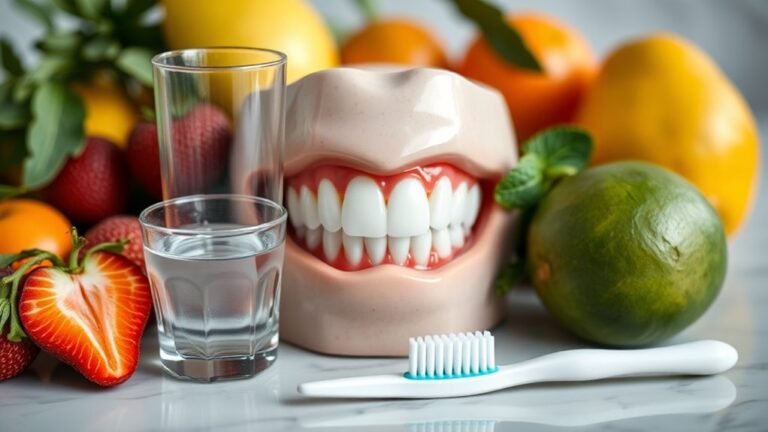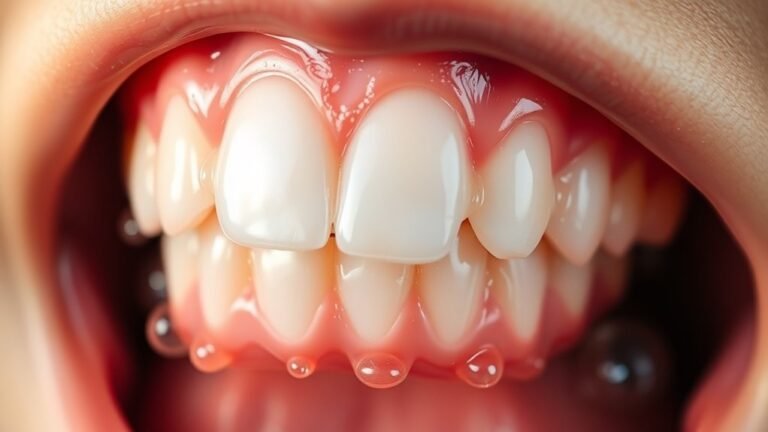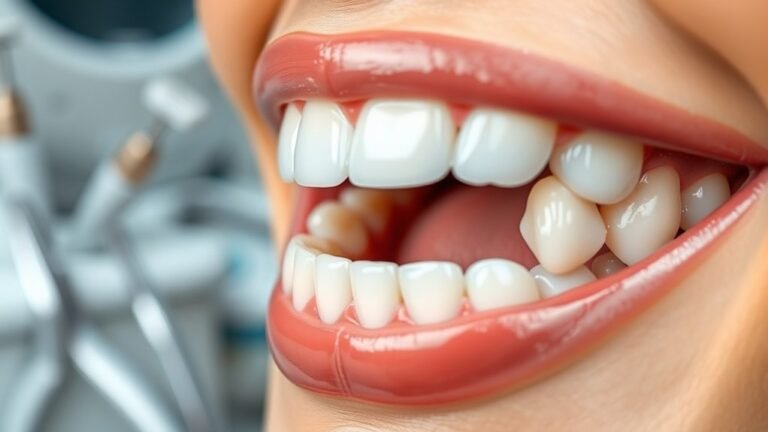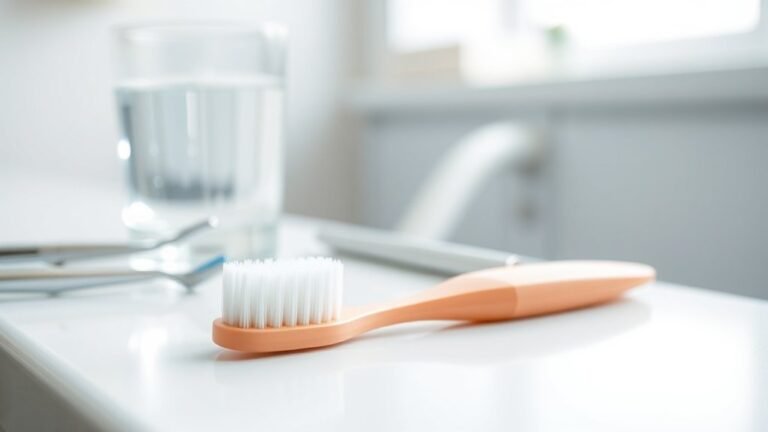Dry Mouth Accelerates Enamel Wear Leading to Tooth Sensitivity
Dry mouth accelerates enamel wear by reducing saliva flow, which protects your teeth from acids and helps in remineralization. Without adequate saliva, your mouth’s environment becomes more acidic, leading to greater enamel erosion. This erosion exposes sensitive dentin, resulting in discomfort with hot, cold, or sweet foods. To manage dry mouth and protect your enamel, consider staying hydrated and stimulating saliva production. There’s more you can do to combat these effects and maintain oral health.
Key Takeaways
- Dry mouth reduces saliva, which is essential for neutralizing acids and protecting enamel from erosion.
- Lack of saliva creates an acidic environment, accelerating enamel wear and increasing tooth sensitivity.
- Enamel erosion exposes dentin, leading to heightened sensitivity to temperature changes and certain foods.
- Impaired saliva flow hinders the natural remineralization process, making teeth more vulnerable to decay.
- Managing dry mouth with hydration and dental care is crucial to preventing enamel erosion and sensitivity.
Understanding Dry Mouth: Causes and Symptoms
Although you might not think about it often, dry mouth, or xerostomia, is a common condition that can greatly impact your oral health. This condition occurs when there’s a significant saliva flow reduction, leading to discomfort and various complications. Medications, dehydration, and certain health conditions can contribute to dry mouth. You may experience symptoms like difficulty swallowing, a persistent thirst, or a dry, sticky feeling in your mouth. Additionally, dry mouth can increase your risk for tooth sensitivity, as reduced saliva can fail to protect your enamel from decay and erosion. Being aware of these symptoms is essential, as managing dry mouth can help maintain your overall oral health and prevent further issues with tooth sensitivity.
The Role of Saliva in Oral Health
Saliva serves as an essential protector for your teeth and gums, playing multiple roles in maintaining oral health. Its importance can’t be overstated, especially when it comes to preventing enamel wear and ensuring effective dental care. Here are three key functions of saliva:
Saliva is vital for oral health, protecting teeth and gums while preventing enamel erosion.
- Neutralizes Acids: Saliva helps to balance the pH in your mouth, reducing the acidity that can lead to enamel erosion.
- Remineralization: It contains minerals like calcium and phosphate, which support the repair and strengthening of tooth surfaces.
- Antibacterial Properties: Saliva washes away food particles and harmful bacteria, lowering the risk of cavities and gum disease.
How Dry Mouth Contributes to Enamel Erosion
When your mouth is dry, the protective functions of saliva are greatly diminished, leading to an increased risk of enamel erosion. Saliva plays an essential role in maintaining a healthy oral microbiome, which helps balance harmful bacteria that can contribute to cavity formation. Without adequate saliva, the pH in your mouth can drop, resulting in an acidic environment that accelerates enamel wear. This erosion exposes the underlying dentin, making your teeth more vulnerable to sensitivity and decay. In addition, reduced saliva impairs cavity prevention efforts, as it limits the natural remineralization process that protects enamel. To maintain your dental health, it’s essential to address dry mouth and seek solutions that restore salivary flow.
The Connection Between Enamel Wear and Tooth Sensitivity
Enamel wear greatly influences tooth sensitivity, leading to discomfort and pain for many individuals. When enamel thins, it exposes the underlying dentin, which can heighten sensitivity. Here are three key points to understand this connection:
- Potassium Nitrate: This compound can help desensitize nerves in exposed dentin, providing relief from sensitivity.
- Fluoride: Regular use of fluoride strengthens enamel, making it more resistant to wear and reducing the risk of sensitivity.
- Saliva’s Role: Saliva helps neutralize acids and remineralize enamel, which is essential in preventing wear and maintaining tooth health.
Identifying the Signs of Tooth Sensitivity
Recognizing the signs of tooth sensitivity is essential for maintaining your oral health. You might experience sharp pain when consuming hot, cold, or sweet foods, which can indicate underlying issues. Understanding these common symptoms and their causes can help you take proactive steps to protect your teeth.
Common Symptoms Experienced
Tooth sensitivity can manifest in several noticeable ways, making it essential to identify the signs early on. You might experience discomfort when consuming hot, cold, or sweet foods and beverages. Recognizing these symptoms can help you take action promptly.
Here are some common symptoms to watch for:
- Sharp Pain: A sudden, unexpected jolt of pain when teeth come into contact with temperature extremes.
- Lingering Discomfort: Sensations that persist after consuming hot or cold items, indicating heightened sensitivity.
- Sensitivity to Touch: Pain or discomfort when brushing, flossing, or even lightly touching your teeth.
If you notice these symptoms, consider consulting a dental professional to address your concerns and explore potential solutions.
Causes of Tooth Sensitivity
When you experience tooth sensitivity, it’s often linked to various underlying causes that can exacerbate the discomfort. One common cause is enamel erosion, which can result from acidic foods, aggressive brushing, or grinding your teeth. Gum recession is another factor, exposing the sensitive roots of your teeth. Additionally, dental conditions like cavities or cracks can heighten sensitivity. Certain dental treatments, such as teeth whitening, might also lead to temporary sensitivity. If you suffer from dry mouth, it can worsen the situation by reducing saliva, a natural protector against enamel wear. Identifying these causes is essential for effective management and relief of tooth sensitivity, enabling you to maintain better dental health.
The Impact of Diet on Dry Mouth and Enamel Health
Your diet plays an essential role in managing dry mouth and protecting enamel health. Staying hydrated supports saliva production, while acidic foods and beverages can exacerbate enamel erosion. By focusing on a nutrient-rich diet, you can help maintain oral health and reduce discomfort associated with dry mouth.
Hydration and Saliva Production
Hydration plays an essential role in maintaining ideal saliva production, which directly impacts both dry mouth and enamel health. When you’re well-hydrated, your body can produce enough saliva to protect your teeth and gums. Here are three key ways hydration supports oral health:
- Cleansing Action: Saliva helps wash away food particles and neutralizes acids, reducing the risk of cavities.
- Mineral Balance: Adequate saliva levels maintain essential minerals that strengthen enamel and prevent wear.
- Comfort and Function: Proper hydration alleviates dry mouth symptoms, improving your ability to chew and speak comfortably.
Acidic Foods and Beverages
Consuming acidic foods and beverages can greatly impact both dry mouth and enamel health. When you indulge in items like citrus fruits, sodas, or vinegar-based dressings, the acid can erode your enamel. This erosion not only weakens your teeth but can also exacerbate dry mouth by stimulating less saliva production. If you’re already experiencing dry mouth, these acidic substances can heighten tooth sensitivity, making it uncomfortable to eat or drink. To protect your enamel and maintain oral health, consider moderating your intake of acidic items. Drinking water after consuming acidic foods can help neutralize the acid, while maintaining proper hydration supports saliva production. Prioritizing enamel health is essential for a comfortable and pain-free experience with your teeth.
Nutrient-Rich Diet Benefits
A nutrient-rich diet plays an essential role in maintaining both dry mouth and enamel health. By incorporating specific nutrients, you can support saliva production and strengthen enamel. Consider these key components:
- Calcium: Found in dairy, leafy greens, and almonds, calcium strengthens your enamel and promotes overall dental health.
- Vitamin D: This vitamin, available in fatty fish and fortified foods, helps your body absorb calcium effectively.
- Hydration: Water-rich foods like fruits and vegetables not only keep you hydrated but also stimulate saliva flow, combating dry mouth.
Effective Remedies for Managing Dry Mouth
Managing dry mouth effectively requires a combination of strategies that target the underlying causes and alleviate symptoms. Start by increasing your water intake throughout the day to keep your mouth hydrated. Chewing sugar-free gum or sucking on sugar-free candies can stimulate saliva production. You might also consider using over-the-counter saliva substitutes or oral moisturizers, which can provide temporary relief. Avoid caffeine and alcohol, as these can worsen dryness. Implementing a humidifier at night can help maintain moisture in the air while you sleep. Finally, visiting your dentist regularly is essential for monitoring your oral health and discussing any potential medications that could be contributing to dry mouth. By taking these steps, you can effectively manage your dry mouth symptoms.
Tips for Protecting Your Enamel
To protect your enamel, staying hydrated is essential, as it helps maintain saliva production. Incorporating fluoride treatments into your dental routine can strengthen your teeth against decay. Additionally, adjusting your diet by reducing acidic and sugary foods can greatly benefit your enamel’s health.
Hydration Importance
While it might seem like a simple task, staying properly hydrated plays an essential role in protecting your tooth enamel. Here are three reasons to prioritize hydration:
- Saliva Production: Adequate water intake boosts saliva, which helps neutralize acids that can erode enamel.
- Nutrient Absorption: Staying hydrated aids in the absorption of essential minerals like calcium and phosphate, crucial for strong enamel.
- Dry Mouth Prevention: Drinking enough water prevents dry mouth, reducing the risk of enamel wear and tooth sensitivity.
Fluoride Treatments
Fluoride treatments can greatly enhance your enamel’s resilience against decay and sensitivity, especially if you’re prone to dry mouth. These treatments work by replenishing lost minerals and strengthening the enamel, making it more resistant to acid attacks from bacteria. You can receive fluoride in various forms, including professional applications at your dentist’s office or over-the-counter toothpaste and mouth rinses. It is crucial to follow your dentist’s recommendations regarding the frequency of treatments, as too much fluoride can lead to other issues. Make sure to maintain a consistent oral hygiene routine by brushing twice daily with fluoride toothpaste and flossing regularly. With these practices, you’ll help protect your enamel and reduce the risk of sensitivity and decay.
Diet Adjustments
Maintaining strong enamel goes beyond fluoride treatments; your diet plays a significant role as well. To protect your enamel, consider making these adjustments:
- Increase Calcium Intake: Foods rich in calcium, like dairy products, leafy greens, and almonds, help strengthen enamel and support overall oral health.
- Limit Sugary Snacks: Reduce your consumption of sugary foods and beverages, as they can contribute to enamel erosion and promote tooth decay.
- Stay Hydrated: Drink plenty of water throughout the day to combat dry mouth. Staying hydrated helps wash away food particles and neutralizes acids in your mouth.
When to Seek Professional Help
When should you consider reaching out to a dental professional about dry mouth and tooth sensitivity? If you experience persistent dry mouth, it’s essential to consult your dentist. This condition can lead to enamel erosion and heightened sensitivity, impacting your overall oral health. Seek professional help if you notice any of the following symptoms:
| Symptom | Importance | Recommended Action |
|---|---|---|
| Persistent dry mouth | Can lead to serious dental issues | Schedule a dental appointment |
| Increased tooth sensitivity | Indicates possible enamel wear | Get a dental evaluation |
| Swollen or sore gums | May signal gum disease | Visit your dentist promptly |
| Difficulty swallowing | Can affect daily life | Consult your healthcare provider |
| Frequent cavities | Indicates poor enamel health | Discuss preventive care |
Addressing these concerns early can help prevent more extensive dental issues.
Maintaining Overall Oral Health Despite Dry Mouth
Even if you’re grappling with dry mouth, there are effective strategies to maintain your oral health. Here are three key approaches to contemplate:
- Stay Hydrated: Drink plenty of water throughout the day to keep your mouth moist and support saliva production.
- Use Saliva Substitutes: Over-the-counter saliva substitutes can help alleviate dryness and protect your enamel.
- Practice Good Oral Hygiene: Brush with fluoride toothpaste and floss daily to prevent plaque buildup and reduce tooth sensitivity.
Frequently Asked Questions
Can Medications Cause Dry Mouth and Enamel Erosion?
Yes, certain medications can cause dry mouth, which may contribute to enamel erosion. If you’re experiencing this issue, consult your healthcare provider to discuss potential alternatives or solutions to minimize the impact on your oral health.
How Does Age Affect Dry Mouth and Tooth Sensitivity?
As you age, your saliva production often decreases, increasing your risk for dry mouth. This can enhance tooth sensitivity, making it essential to maintain oral hygiene and consult your dentist for effective management strategies.
Are There Specific Foods That Worsen Dry Mouth?
Yes, certain foods can worsen dry mouth. Salty, spicy, or acidic foods, along with caffeine and alcohol, can exacerbate the condition. Staying hydrated and choosing softer foods can help alleviate discomfort and improve your oral health.
Can Dry Mouth Lead to Gum Disease?
Yes, dry mouth can definitely lead to gum disease. When saliva decreases, it hampers your mouth’s natural defense, allowing bacteria to flourish. This imbalance can pave the way for inflammation and periodontal issues.
Is Tooth Sensitivity Reversible With Treatment?
Yes, tooth sensitivity can be reversible with proper treatment. By addressing underlying issues, using desensitizing toothpaste, and following professional advice, you can greatly reduce sensitivity and improve your overall dental health. Regular check-ups are essential.
Conclusion
In conclusion, managing dry mouth is essential for preserving your enamel and preventing tooth sensitivity. Have you ever imagined what it feels like to enjoy your favorite foods without discomfort? By staying hydrated, using saliva substitutes, and practicing good oral hygiene, you can protect your teeth and maintain a healthy smile. Remember, seeking professional help when necessary can make all the difference in keeping your mouth comfortable and your enamel strong. Prioritize your oral health today!






